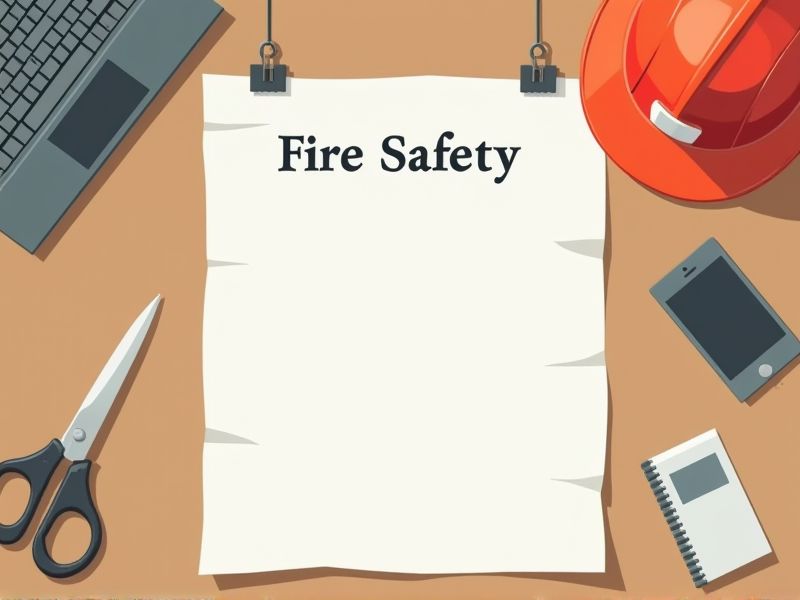
Fire Safety Engineers require specialized certifications to validate their expertise in assessing and mitigating fire risks effectively. These certifications ensure they possess the critical knowledge of fire behavior, building codes, and safety regulations necessary for creating safe environments. Without the proper credentials, engineers might lack the credibility and technical proficiency needed to design and implement effective fire protection measures. Some vital certifications that might be required for a Fire Safety Engineer include the following.
NFPA Certified Fire Protection Specialist (CFPS)
Having an NFPA Certified Fire Protection Specialist credential ensures a Fire Safety Engineer is well-versed in current codes and standards, promoting safer building designs. This certification demonstrates a comprehensive understanding of risk analysis, which is crucial for identifying potential fire hazards. A CFPS credential provides a competitive edge in the field, as it validates the engineer's commitment to maintaining high safety standards. Employers and clients gain confidence in the engineer's expertise, fostering trust in their fire protection strategies.
NICET Certification in Fire Protection Engineering
NICET Certification in Fire Protection Engineering ensures that fire safety engineers have met nationally recognized standards, indicating their competence and reliability. The certification process involves rigorous testing and experience requirements, providing assurance to employers and clients about the engineer's skills. Certified professionals are often preferred for hiring, as they demonstrate a commitment to ongoing professional development and adherence to industry standards. NICET certification can lead to greater career opportunities and increased responsibilities in fire safety projects.
Professional Engineer (PE) License in Fire Protection or Safety Engineering
Obtaining a Professional Engineer (PE) License in Fire Protection or Safety Engineering ensures a fire safety engineer meets national standards of competence and ethics. This licensure establishes credibility and trust with clients and stakeholders, leading to increased job opportunities and projects. Licensed engineers are legally authorized to sign off on designs and reports, which is crucial for regulatory compliance and public safety. The process of becoming licensed often provides in-depth knowledge and skills enhancement, improving the engineer's ability to address complex fire safety challenges.
Certified Fire Investigator (CFI)
A Certified Fire Investigator (CFI) possesses specialized knowledge in determining the cause and origin of fires, which enhances the analytical capabilities of a Fire Safety Engineer. By collaborating with CFIs, fire safety engineers can integrate investigative insights into safer building designs, reducing the likelihood of future incidents. CFIs provide crucial data that informs fire risk assessments, helping engineers develop more effective safety protocols. Their expertise in spotting fire-related patterns aids engineers in understanding complex scenarios, thereby improving overall fire prevention strategies.
Certified Fire Inspector
A Certified Fire Inspector ensures compliance with fire safety codes and regulations, which aids Fire Safety Engineers in designing buildings that mitigate fire risks. Fire Inspectors provide critical feedback and real-world data to engineers, improving the accuracy of fire safety models and simulations. Their expertise in identifying potential hazards enhances the engineer's ability to prioritize critical design adjustments in fire protection systems. Collaboration between inspectors and engineers fosters an integrated approach to fire safety, reducing the likelihood of costly design errors or oversights.
Certified Safety Professional (CSP)
Obtaining the Certified Safety Professional (CSP) credential enhances a fire safety engineer's credibility, leading to greater trust from employers and stakeholders. The CSP certification ensures the engineer possesses comprehensive knowledge of safety standards and regulations, crucial for developing effective fire protection strategies. The certification process equips engineers with modern risk assessment skills, enabling them to mitigate potential hazards more effectively. CSP holders often see improved career prospects and earning potential, as the certification signifies a commitment to excellence and continuous professional development in safety practices.
OSHA 30-Hour General Industry Certification
The OSHA 30-Hour General Industry Certification provides comprehensive knowledge of workplace safety standards, directly impacting a Fire Safety Engineer's ability to design compliant systems. When Fire Safety Engineers understand OSHA guidelines, they can better evaluate hazards and mitigate risks in their planning. This certification enhances their credibility and ensures their solutions align with regulatory requirements. By adhering to OSHA standards, Fire Safety Engineers can improve the safety outcomes in diverse industrial settings.
LEED Accredited Professional (LEED AP)
Possessing a LEED Accredited Professional (LEED AP) credential equips a Fire Safety Engineer with proficiency in sustainable building practices, which promotes integrating fire safety measures without compromising environmental goals. This expertise supports designing systems that align fire protection with energy efficiency, often leading to reduced operational costs and improved building performance. With LEED AP, a Fire Safety Engineer can guide projects through the LEED certification process, ensuring compliance with both safety standards and sustainable design criteria. The ability to balance stringent safety regulations with ecological considerations positions these engineers as valuable assets in contemporary construction projects focused on sustainability.
Certified Hazardous Materials Manager (CHMM)
Fire safety engineers often encounter hazardous materials in their work, which necessitates a deep understanding of how these substances behave under different conditions. A Certified Hazardous Materials Manager (CHMM) provides specialized knowledge in handling and mitigating risks associated with hazardous materials. Their expertise ensures compliance with regulations and enhances safety protocols during fire prevention, response, and recovery. With the CHMM's input, fire safety plans can more effectively address the complexities of hazardous material incidents.
Fire Safety Audit Certification
Fire Safety Audit Certification enhances a fire safety engineer's credibility and demonstrates their adherence to established safety standards. Insurers and regulators often require such certification to ensure risk mitigation strategies are effectively implemented. The certification process provides engineers with updated knowledge of current fire safety technologies and regulations. Clients and stakeholders tend to trust certified engineers more, reducing potential liability in fire safety projects.
Summary
By earning certifications, you can bolster your credibility as a fire safety engineer, enhancing trust among clients and employers. These credentials often expand your knowledge base, equipping you with advanced skills to handle complex fire safety scenarios more effectively. This expertise may lead to increased job opportunities and potential salary growth, given the demand for certified professionals. Your ability to design and evaluate safety systems can result in safer environments, reducing fire-related incidents and damages.
